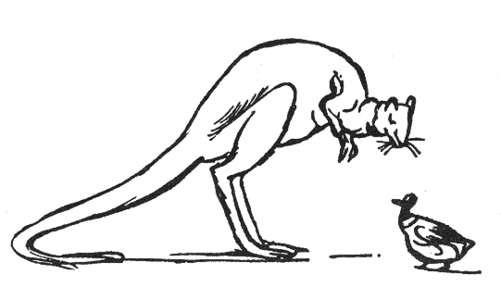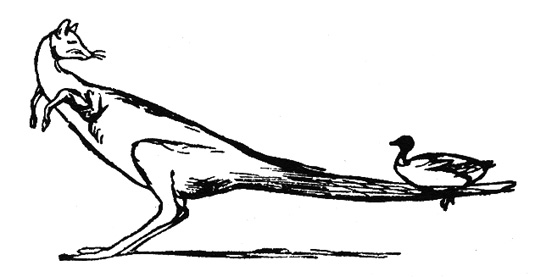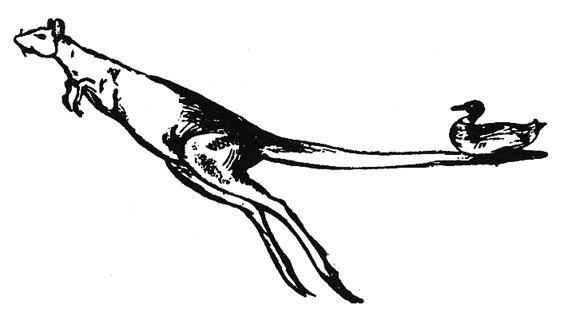Table of Contents
7. Packing
Before You Read
- Do you like going on trips? What kind of trips do you enjoy most?
- How do you feel about having to pack for a trip?
- Have you ever discovered on a trip that you have forgotten to pack a few things you very much need, or that you can’t find them easily?
- Does this make you angry or does it make you laugh at yourself?
Now read this description of how the author and his friends pack.
1. I said I’d pack.
I rather pride myself on my packing. Packing is one of those many things that I feel I know more about than any other person living. (It surprises me myself, sometimes, how many such things there are.) I impressed the fact upon George and Harris and told them that they had better leave the whole matter entirely to me. They fell into the suggestion with a readiness that had something uncanny about it. George put on a pipe and spread himself over the easy-chair, and Harris cocked his legs on the table and lit a cigar.
pride myself on: am proud of
2. This was hardly what I intended. What I had meant, of course, was, that I should boss the job, and that Harris and George should potter about under my directions, I pushing them aside every now and then with, “Oh, you!” “Here, let me do it.” “There you are, simple enough!” — really teaching them, as you might say. Their taking it in the way they did irritated me. There is nothing does irritate me more than seeing other people sitting about doing nothing when I’m working.
fell into: here, accepted
uncanny: strange, weird
3. I lived with a man once who used to make me mad that way. He would loll on the sofa and watch me doing things by the hour together. He said it did him real good to look on at me, messing about.
potter about: do some unimportant things
Now, I’m not like that. I can’t sit still and see another man slaving and working. I want to get up and superintend, and walk round with my hands in my pockets, and tell him what to do. It is my energetic nature. I can’t help it.
4. However, I did not say anything, but started the packing. It seemed a longer job than I had thought it was going to be; but I got the bag finished at last, and I sat on it and strapped it.
“Ain’t you going to put the boots in?” said Harris.
And I looked round, and found I had forgotten them. That’s just like Harris. He couldn’t have said a word until I’d got the bag shut and strapped, of course. And George laughed — one of those irritating, senseless laughs of his. They do make me so wild.
5. I opened the bag and packed the boots in; and then, just as I was going to close it, a horrible idea occurred to me. Had I packed my toothbrush? I don’t know how it is, but I never do know whether I’ve packed my toothbrush.
My toothbrush is a thing that haunts me when I’m travelling, and makes my life a misery. I dream that I haven’t packed it, and wake up in a cold perspiration, and get out of bed and hunt for it. And, in the morning, I pack it before I have used it, and have to unpack again to get it, and it is always the last thing I turn out of the bag; and then I repack and forget it, and have to rush upstairs for it at the last moment and carry it to the railway station, wrapped up in my pocket-handkerchief.
haunts: here, to repeatedly give trouble
6. Of course I had to turn every mortal thing out now, and, of course, I could not find it. I rummaged the things up into much the same state that they

I found the toothbrush inside a boot.
must have been before the world was created, and when chaos reigned. Of course, I found George’s and Harris’s eighteen times over, but I couldn’t find my own. I put the things back one by one, and held everything up and shook it. Then I found it inside a boot. I repacked once more.
every mortal thing: every ordinary thing
rummaged: searched in a hurried or careless way
7. When I had finished, George asked if the soap was in. I said I didn’t care a hang whether the soap was in or whether it wasn’t; and I slammed the bag shut and strapped it, and found that I had packed my tobacco-pouch in it, and had to re-open it. It got shut up finally at 10.05 p.m., and then there remained the hampers to do. Harris said that we should be wanting to start in less than twelve hours’ time and thought that he and George had better do the rest; and I agreed and sat down, and they had a go.
hampers: large baskets for carrying food
8. They began in a light-hearted spirit, evidently intending to show me how to do it. I made no comment; I only waited. With the exception of George, Harris is the worst packer in this world; and I looked at the piles of plates and cups, and kettles, and bottles, and jars, and pies, and stoves, and cakes, and tomatoes, etc., and felt that the thing would soon become exciting.
It did. They started with breaking a cup. That was the first thing they did. They did that just to show you what they could do, and to get you interested.
Then Harris packed the strawberry jam on top of a tomato and squashed it, and they had to pick out the tomato with a teaspoon.
9. And then it was George’s turn, and he trod on the butter. I didn’t say anything, but I came over and sat on the edge of the table and watched them.

George trod on the butter.
It irritated them more than anything I could have said. I felt that. It made them nervous and excited, and they stepped on things, and put things behind them, and then couldn’t find them when they wanted them; and they packed the pies at the bottom, and put heavy things on top, and smashed the pies in.
trod on: stepped on
10. They upset salt over everything, and as for the butter! I never saw two men do more with one-and-two pence worth of butter in my whole life than they did. After George had got it off his slipper, they tried to put it in the kettle. It wouldn’t go in, and what was in wouldn’t come out. They did scrape it out at last, and put it down on a chair, and Harris sat on it, and it stuck to him, and they went looking for it all over the room.
11. “I’ll take my oath I put it down on that chair,” said George, staring at the empty seat.
“I saw you do it myself, not a minute ago,” said Harris.
Then they started round the room again looking for it; and then they met again in the centre and stared at one another.
“Most extraordinary thing I ever heard of,” said George.
“So mysterious!” said Harris.
Then George got round at the back of Harris and saw it.
“Why, here it is all the time,” he exclaimed, indignantly.
“Where?” cried Harris, spinning round.
“Stand still, can’t you!” roared George, flying after him.
And they got it off, and packed it in the teapot.
12.Montmorency was in it all, of course. Montmorency’s ambition in life is to get in the way and be sworn at. If he can squirm in anywhere where he particularly is not wanted, and be a perfect nuisance, and make people mad, and have

Montmorency got into the hamper... before
Harris could land him with the frying-pan.
things thrown at his head, then he feels his day has not been wasted.
be sworn at: here, get scolded
To get somebody to stumble over him, and curse him steadily for an hour, is his highest aim and object; and, when he has succeeded in accomplishing this, his conceit becomes quite unbearable.
conceit: here, his pride in himself
13. He came and sat down on things, just when they were wanted to be packed; and he laboured under the fixed belief that, whenever Harris
or George reached out their hand for anything,
it was his cold damp nose that they wanted.
He put his leg into the jam, and he worried
the teaspoons, and he pretended that the lemons were rats, and got into the hamper and killed three of them before Harris could land him with the frying-pan.
worried: disturbed
14. Harris said I encouraged him. I didn’t encourage him. A dog like that doesn’t want any encouragement. It’s the natural, original sin that is born in him that makes him do things like that.
The packing was done at 12.50; and Harris sat on the big hamper, and said he hoped nothing would be found broken. George said that if anything was broken it was broken, which reflection seemed to comfort him. He also said he was ready for bed. We were all ready for bed. Harris was to sleep with us that night, and we went upstairs.
reflection: thought
15. We tossed for beds, and Harris had to sleep with me. He said :
“Do you prefer the inside or the outside, J.?”
I said I generally preferred to sleep inside a bed.
Harris said it was odd.
George said:
“What time shall I wake you fellows?”
Harris said:
“Seven.”
I said:
“No — six,” because I wanted to write some letters.
Harris and I had a bit of a row over it, but at last split the difference, and said half-past six.
“Wake us at 6.30, George,” we said.
split the difference: this means that they agreed on 6.30 because it was halfway between six and seven
16.George made no answer, and we found, on going over, that he had been asleep for sometime; so we placed the bath where he could tumble into it on getting out in the morning, and went to bed ourselves.
Thinking about the Text
I.Discuss in pairs and answer each question below in a short paragraph (30–40 words).
1.How many characters are there in the narrative? Name them. (Don’t forget the dog!).
2.Why did the narrator (Jerome) volunteer to do the packing?
3.How did George and Harris react to this? Did Jerome like their reaction?
4.What was Jerome’s real intention when he offered to pack?
5.What did Harris say after the bag was shut and strapped? Why do you think he waited till then to ask?
6.What “horrible idea” occurred to Jerome a little later?
7.Where did Jerome finally find the toothbrush?
8.Why did Jerome have to reopen the packed bag?
9.What did George and Harris offer to pack and why?
10.While packing the hamper, George and Harris do a number of foolish and funny things. Tick the statements that are true.
(i)They started with breaking a cup.
(ii)They also broke a plate.
(iii)They squashed a tomato.
(iv)They trod on the butter.
(v)They stepped on a banana.
(vi)They put things behind them, and couldn’t find them.
(vii)They stepped on things.
(viii)They packed the pictures at the bottom and put heavy things on top.
(ix)They upset almost everything.
(x)They were very good at packing.
II.What does Jerome say was Montmorency’s ambition in life? What do you think of Montmorency and why?
III.Discuss in groups and answer the following questions in two or three paragraphs (100–150 words)
1.Of the three, Jerome, George and Harris, who do you think is the best or worst packer? Support your answer with details from the text.
2.How did Montmorency ‘contribute’ to the packing?
3.Do you find this story funny? What are the humorous elements in it? (Pick out at least three, think about what happens, as well as how it is described.)
Thinking about Language
I.Match the words/phrases in Column A with their meanings in Column B.

II.Use suitable words or phrases from Column A above to complete the paragraph given below.
A Traffic Jam
During power cuts, when traffic lights go off, there is utter............... at crossroads. Drivers add to the confusion by..................over their right of way, and nearly come to blows. Sometimes passers-by, seeing a few policemen......... at regulating traffic, step in to help. This gives them a feeling of having...................... something.
III.Look at the sentences below. Notice that the verbs (italicised) are all in their bare form.
- Simple commands:
–Stand up!
–Put it here!
- Directions: (to reach your home)
Board Bus No.121 and get down at Sagar Restaurant. From there turn right and walk till you reach a book shop. My home is just behind the shop.
- Dos and don’ts:
–Always get up for your elders.
–Don’t shout in class.
- Instructions for making a fruit salad:
Ingredients
Oranges –2
Pineapple –one large piece
Cherries–250 grams
Bananas–2
Any other fruit you like
Wash the fruit. Cut them into small pieces. Mix them well. Add a few drops of lime juice. Add sugar to taste. Now add some cream (or ice cream if you wish to make fruit salad with ice cream.)
1. Now work in pairs. Give
(i)two commands to your partner.
(ii)two do’s and don’ts to a new student in your class.
(iii)directions to get to each other’s houses.
(iv)instructions for moving the body in an exercise or a dance, or for cooking something.
2. The table below has some proverbs telling you what to do and what not to do. Fill in the blanks and add a few more such proverbs to the table.
 |
Writing
You have seen how Jerome, George and Harris mess up their packing, especially of the hamper. From their mistakes you must have thought of some dos and don’ts for packing. Can you give some tips for packing by completing the paragraph below?
First pack all the heavy items, especially the ones you don’t need right away. Then ...
Here are some words and phrases you can use to begin your sentences with:
- Then
- Next
- Now
- Remember
- Don’t forget
- At last/Finally
Speaking
Look at this sentence.
“I told George and Harris that they had better leave the whole matter entirely
to me.”
The words had better are used
- in an advice or suggestion:
- You had better take your umbrella; it looks like rain.
- in an order
You had better complete your homework before you go out to play. - as a threat
You had better leave or I’ll have you arrested for trespass!
When we speak, we say you’d/I’d/he’d better, instead of you had better, etc.
Work in pairs to give each other advice, orders or suggestions, or even to threaten each other. Imagine situations like the following: Your partner
1.hasn’t returned a book to the library.
2.has forgotten to bring lunch.
3.hasn’t got enough change for bus fare.
4.has found out a secret about you.
5.has misplaced your English textbook.
Activity
Collect some examples of instructions, directions, etc. from notice boards and pamphlets. Bring them to class and display them, or read them out. (You can collect examples in English as well as other languages, Indian or foreign.)
Here is an example for you:

The Duck and the Kangaroo
This is a humorous poem of a kind known as ‘Nonsense Verse’, by Edward Lear. Read it and enjoy.

I
Said the Duck to the Kangaroo,
“Good gracious! how you hop!
Over the fields and the water too,
As if you never would stop!
My life is a bore in this nasty pond,
And I long to go out in the world beyond!
I wish I could hop like you!”
Said the Duck to the Kangaroo.
II
“Please give me a ride on your back!”
Said the Duck to the Kangaroo.
“I would sit quite still, and say nothing but ‘Quack’,
The whole of the long day through!
And we’d go to the Dee, and the Jelly Bo Lee,
Over the land, and over the sea;
Please take me a ride! O do!”
Said the Duck to the Kangaroo.

III
Said the Kangaroo to the Duck,
“This requires some little reflection;
Perhaps on the whole it might bring me luck,
And there seems but one objection,
Which is, if you’ll let me speak so bold,
Your feet are unpleasantly wet and cold,
And would probably give me the roo-
Matiz!” said the Kangaroo.

IV
Said the Duck, “As I sat on the rocks,
I have thought over that completely,
And I bought four pairs of worsted socks
Which fit my web-feet neatly.
And to keep out the cold I’ve bought a cloak,
And every day a cigar I’ll smoke,
All to follow my own dear true
Love of a Kangaroo!”
V
Said the Kangaroo, “I’m ready!
All in the moonlight pale;
But to balance me well, dear Duck, sit steady!
And quite at the end of my tail!”
So away they went with a hop and a bound,
And they hopped the whole world three times round;
And who so happy — O who,
As the Duck and the Kangaroo?

